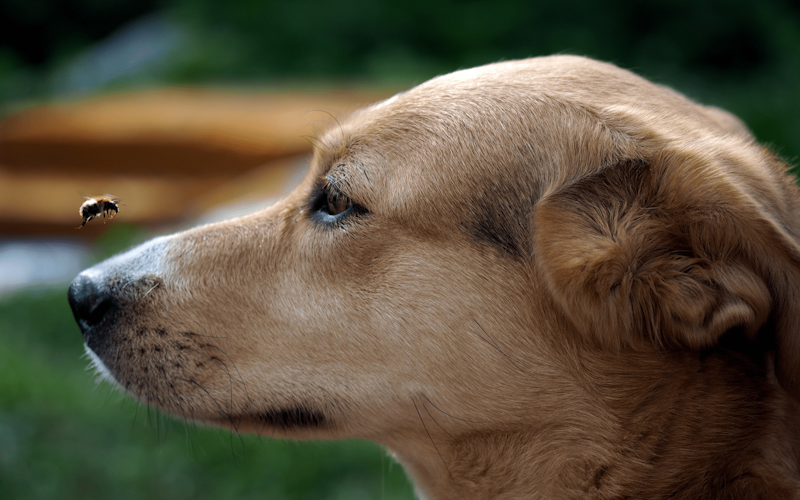Is your dog itching and scratching from mosquito bites? Learn how to soothe discomfort, prevent infection, and protect your furry friend with our expert guide.

Mosquito bites are a common nuisance for dogs, especially in warm and humid climates. While most mosquito bites are harmless, some can carry diseases like heartworm, West Nile virus, or Zika virus that can pose serious health risks for your dog. Therefore, it is important to recognize and treat mosquito bites promptly and prevent them from happening in the first place.
Identifying Mosquito Bites
Mosquito bites on dogs typically look like small, red, and raised bumps on the skin. They can appear anywhere on the body, but are more likely to occur on areas with less fur, such as the ears, nose, belly, or legs. Mosquito bites can cause itchiness, swelling, and irritation for your dog, and may lead to secondary infections if scratched or licked excessively.
Mosquito bites can sometimes be confused with other skin conditions, such as allergies, fleas, or mites. To differentiate them, look for the following signs:
- Allergies: Allergic reactions can cause generalized itching, redness, and inflammation on the skin, and may be accompanied by sneezing, coughing, or watery eyes. Allergies can be triggered by various factors, such as food, pollen, dust, or medications.
- Fleas: Flea bites are small, dark, and clustered on the skin, and are often found on the back, neck, or tail of the dog. Fleas can also cause hair loss, scabs, or tapeworms in dogs. Fleas can be detected by using a flea comb or looking for flea dirt (black specks) on the dog’s fur or bedding.
- Mites: Mite infestations can cause mange, a condition that causes severe itching, hair loss, crusty skin, and sores on the dog. Mites can be microscopic or visible to the naked eye, and can affect different parts of the dog’s body, such as the ears, face, or paws. Mites can be diagnosed by a skin scraping or a microscope examination by a veterinarian.

Treating Mosquito Bites
If your dog has mosquito bites, there are some safe and effective home remedies that you can use to soothe the itch and discomfort. These include:
- Cold compress: Apply a cold, wet cloth or ice pack to the affected area for 10 to 15 minutes, several times a day. This can help reduce the swelling and inflammation of the bite.
- Oatmeal bath: Give your dog a bath with oatmeal shampoo or a homemade oatmeal solution (mix one cup of oatmeal with four cups of warm water and let it soak for 10 minutes). Oatmeal has anti-inflammatory and soothing properties that can help relieve the itchiness and irritation of the bite.
- Baking soda paste: Mix one teaspoon of baking soda with a few drops of water to form a thick paste. Apply the paste to the bite and let it dry for 10 to 15 minutes, then rinse it off with water. Baking soda can help neutralize the acidity of the bite and reduce the itchiness and inflammation.
While these home remedies can help ease the symptoms of mosquito bites, they are not a substitute for veterinary care. If your dog has a severe case of mosquito bites or an allergic reaction, you should consult your veterinarian for proper treatment. Your veterinarian may prescribe antihistamines, steroids, antibiotics, or other medications to help your dog recover.
Preventing Mosquito Bites
The best way to protect your dog from mosquito bites is to minimize their exposure to mosquitoes and their habitats. Here are some practical tips that you can follow to prevent mosquito bites in your dog:
- Use mosquito repellent: Apply a dog-safe mosquito repellent to your dog’s fur and skin before going outdoors. Avoid using human repellents, as they may contain ingredients that are toxic to dogs, such as DEET or picaridin. Instead, look for repellents that are specifically designed for dogs, such as those that contain natural oils like citronella, lemongrass, or peppermint. Follow the instructions on the label and reapply as needed.
- Avoid dusk/dawn walks: Mosquitoes are most active during dawn and dusk, so try to avoid walking your dog during these times. If you do, choose well-lit and open areas, and avoid places where mosquitoes breed, such as stagnant water, marshes, or ponds.
- Treat the yard: Make your yard less attractive to mosquitoes by removing any sources of standing water, such as birdbaths, buckets, or puddles. You can also use mosquito traps, larvicides, or insecticides to kill or repel mosquitoes in your yard. However, be careful to use products that are safe for dogs and follow the directions carefully.
- Prevent fleas and ticks: Some flea and tick medications can also help prevent mosquito bites in dogs, as they contain ingredients that repel or kill mosquitoes. Ask your veterinarian for the best option for your dog and follow the dosage and frequency instructions.

Conclusion
Mosquito bites can be a nuisance for your dog, but they can also pose serious health risks if left untreated. By following these tips, you can help your dog identify, treat, and prevent mosquito bites, and keep them healthy and happy. If you have any concerns or your dog’s symptoms worsen, do not hesitate to contact your veterinarian for professional advice.
